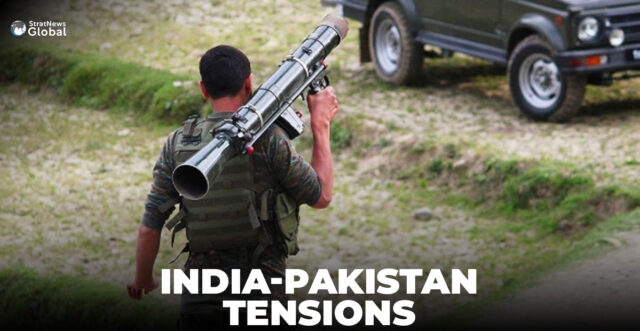China on Monday asked India and Pakistan to ‘exercise restraint’ after the two neighbours exchanged fire at the Line of Control (LoC) following the deadly terror attack in Pahalgam in Jammu and Kashmir that left 26 people dead.
“China welcomes all measures that will help cool down the current situation and supports carrying out fair and just investigations at an early date,” Chinese foreign ministry spokesman Guo Jiakun told reporters.
“As the neighbour of both India and Pakistan, China hopes that India and Pakistan will exercise restraint, work in the same direction, handle relevant differences properly through dialogue and consultation, and jointly uphold peace and stability in the region,” he said.
Ceasefire Violations
Pakistan violated the ceasefire on the Line of Control (LoC) in areas located opposite to Kupwara and Poonch for the fourth consecutive day on Sunday.
The Indian Army said it responded swiftly and effectively following the Pakistani firing.
“During the night of 27-28 April 2025, Pakistan Army posts initiated unprovoked small arms fire across LoC in areas opposite Kupwara & Poonch districts. Indian troops responded swiftly and effectively,” the Indian Army said in a statement as quoted by Hindustan Times.
Following the April 22 attack, Indian security forces have intensified actions to nab those behind the strike.
In an attempt to curb terrorism and dismantle its infrastructure, security forces have bombed the houses of several terrorists in Jammu and Kashmir in the past few days.
Pahalgam Terror Strike
On April 22, Pahalgam’s scenic Baisaran meadow echoed with the sounds of gunshots when terrorists shot dead 26 men, mostly non-Muslim tourists, in one of the deadliest terror attacks on civilians in the country.
Survivors said the gunmen asked some victims about their religion and demanded they recite Islamic verses. Those who failed or hesitated were shot in the head.
Security officials said at least five terrorists split into smaller groups and attacked three zones in the meadow.
Lasting under ten minutes, the assault left 26 dead, including 25 tourists and a local pony operator.
An Intelligence Bureau (IB) official, an Indian Navy Lieutenant, and an Indian Air Force (IAF) corporal — all were on vacation with their families — were among the deceased.
The massacre triggered nationwide outrage and escalated India-Pakistan tensions as New Delhi vowed to avenge the killings.
In an immediate response, India suspended the landmark Indus River water-sharing treaty and closed the Attari-Wagah road border, which acts as a lifeline of Indo-Pak trade and people-to-people ties, besides expelling diplomats, downsizing high commissions and issuing a 48-hour deadline to Pakistani passport holders present in India to leave.
(With inputs from IBNS)





